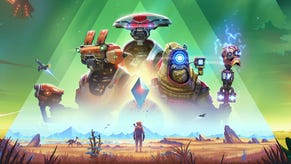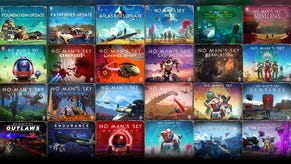New year's resolution: Let's stop screaming
Press any trousers to continue.
2016 was an exhausting year, wasn't it?
I remember sitting down in February with my usual glass of Ribena (let me tell you, making it last a year is an artform) and reading Eurogamer as Chris looked sadly on at just how grim a start the year had gotten off to.
February! Now December's finally gone and in all my (too) many years on this planet, I can't recall another year that seems to have brought so much unrelenting bad news with it. Not even that one with what felt like an eternity of Bryan Adams and nothing but Bryan Adams, although that was pretty bad.
2016 seemed determined to leave its mark in all the things I love. Actors I respected, musicians I grew up adoring, so many people, so many things and even my usual retreat, video games, decided to get in on the 2016 action. Probably so they didn't feel left out or something. You know what video games are like about being left out.
2016 in video games was absolutely ridiculous. On the one hand, some of the most amazing works I've ever had the pleasure to play released in 2016. On the other hand, what on Earth are we doing screaming at everything so often? It can't be healthy.
I've lost track of just how many games people have been screaming at, how many people in games have been screamed at. Over so little of consequence too.
The run up to Mighty No. 9's year-late launch felt like constant screaming. No-one even mentions it now, that all seemed hardly worth the effort. People downvoted a Call Of Duty In Space trailer whilst screaming, people screamed about translations and volleyball and then No Man's Sky happened and hold me, I need a lie down. And don't get me started on the ongoing circus around Star Citizen.
There's more, so many, many more incidents, and it's just been so tiring to watch unfold. So exhausting to be around.
I'm not kidding when I say it makes my heart ache. It makes my heart ache because I know it's not limited to screaming.
I've spoken to people who are scared by what they see happening here, scared by the (relatively) small amount of people who can do so much damage. I've spoken to and listened to the people on the receiving end of the damage and it is not insubstantial. It goes far beyond a bad comment on the internet. Too far beyond that.
All these years in games, I've known people worried, concerned they might get a bit of lip on forums or heard muttering about certain communities being less friendly than others but all this, this is not that. Being afraid is something else.
People are afraid when they just came here to write or write about video games. People are having their lives and the lives of their friends and families upended just for making video games. That's not right. That's not a sane or reasonable response to even the worst video game - except maybe Dragon's Lair. We can't keep making this our normal yet there's been a sinking feeling that this is our normal now.
I'd hoped that if the past few years had taught us anything it would be to steer away from all this yet instead, we seem to have gone all in and embraced it as part of games.
I'm reminded in all too many ways of football during the 70s and 80s. A small crowd of people making enough noise and trouble, dragging people down with them until they are indelibly associated with what football is, until people can't talk about football without talking about the problem with football in the same breath.
I don't want that to be our video game future. I want a better future than that.
Making games is hard so there's always going to be some tension here. It's often said that it's surprising that anything gets released at all in games and that's not as far fetched as it sounds. I'll admit, I struggle not to sing "I wasn't born so much as I fell out" in my worst Strummer-like twang when I release a game. It's a problem and I promise I'm seeking help for it.
Games are often made under really difficult, really stressful conditions where at any point a thousand things can go wrong with them or around the development of them. As everything gets bigger, more complex, more people involved then it's money, it's tech, it's contracts, it's people. So many points where stuff can and will fall down.
We've spent a lot of years pretending it's not work though. So much of being in games is acting like you're some sort of wizard instead of having spent the past six hours tweaking the same number over and over whilst huffing more coffee than is humanly reasonable to huff.
So in many ways, it's not surprising to see some tensions arise when we start to invite people in to support and fund development of a game before it's done. Plenty of folk are oblivious to the work it takes and the risk involved. Nobody told them, after all. Now, that awkward, messy reality that is making games is leaking into everything.
This is mainly fine, we're all working through this and trying to make sense of these new fangled ways of being in and around games. Developers, press and folks who plump up cash and support are mainly trying to work out how to make this work best for everyone and in the main, we are all making this work.
Some folk will invariably find it harder to come round to being faced with the more messy sides of development, preferring instead the version they've had in their head for years. Again, this is mainly fine. We'll get there.
Something like Mighty Number 9 or insert crowdfunded game of choice would have a rocky road in front of it regardless because we haven't got all this sussed just yet. Some devs are managing it better than others but remember, in games there's a million ways things can and do go wrong. Everyone's just trying their best.
Still. Not a problem. Except.
We're playing right into the hands of people who want to make everything kinda awful.
Not everyone around games wants things to work out for the best and there's a relative handful who are trying to make stuff go the other way instead and they're happy to take advantage of the gaps we've left. They fill the cracks with gossip and conspiracy instead of sense and reason. They never stop screaming.
I can see the allure in a way because let's be honest, all the gossip and conspiracy is a zillion times more interesting than anything that ever happens in games. It's just sort of adjacent to reality and we keep writing the conspiracy and gossip into how we talk about games.
One of the ways this awfulness works and spreads is by latching on to reasonable complaints and coming along part and parcel with them.
So maybe some people having a tantrum over a game being set in space seems less bad when there's those two people over there upset about Activison being silly with a remaster. Maybe calling a game a scam and trying to ruin someone's life doesn't seem so bad when there are people upset that it's a year late for realsies. And maybe all those death threats don't seem quite so bad if something is in a trailer but maybe not in the game itself.
We've made it so easy because whenever something like this kicks off, we take it all at face value. Every complaint as valid or true. If it's on Reddit, it must be the truth. We report it as truth, we discuss it as truth. Press, developers, people. Deep down I think we all know that there's a few hundred or a thousand people tops hammering a button on YouTube to downvote a trailer but isn't the idea of a fan revolt much more sexy? That maybe there is a point to it all somewhere beyond being awful?
It's ridiculous of course, most fans just want to be left alone to play their video games, chat about their video games whether they're good, bad or some point inbetween. Most people in games just want to do that - most of us aren't interested in fighting a war or screaming, never were. We all kinda end up dragged into it in one way or another anyway.
Part of how this all plays out is by turning the volume up to eleven. In no time at all, whenever the name of a game is even so much as mentioned in passing, comments sections nosedive into the toilet. The lies, accusations and whatever else concocted repeated ad infinitum. Whole communities become unwelcoming, forums become battle grounds where most good people just leave because why bother sticking around for that?
It increasingly makes our spaces unusable for any reasonable human beings. That's not an accident either, that's with intent.
Whenever something happens in video games, there's a collective time when folks go 'oh, we should learn some lessons from this,' yet the lessons we put out into the world aren't ever ones that deal with this hurt, they aren't lessons to help make this stop or go away - at best, they're to advise people to do a thing and to hope that it never lands on their doorstep.
The advice we reach for is too often to try and teach the magic words that might make everything stop. Don't speak this way, don't put that trailer out, don't look into their eyes. As if we can collectively teach people to market their way out of what's happening. Were that really a thing, we'd have managed it by now. None of this is a marketing problem, no matter how much we kid ourselves. None of this can be fixed by just making better games either.
If we learn nothing else from everything that's happened in and around games in 2016, please let it be that we need to find ways to make this place less awful for everyone - and fast.
Ignoring these people doing terrible things and hoping they go away hasn't worked. Just relying on the fact they're a relative handful of folks hasn't worked either.
These past few years, I've had so many conversations with folk in games who are finding themselves asking this one simple question.
"I wonder when it's my turn?"
The way things have headed, it's not an if, it's a when. What will be the mistake, real or otherwise, that brings the mob to the door? What patch, what update, what game, what tweet, what trailer, what gossip, what rumour, what allegation, what breath taken will be the one?
It's not teaching people to make better games, to release with fewer bugs. Everyone's trying to do that anyway.
One of my all time favourite games is a little daft thing called Flying Train. It's a game by Chris Sievey, the man who lived inside Frank Sidebottom. It's sort of like Frog Fractions long before anyone thought of Frog Fractions and it was tucked away on the B-side of Chris' Camouflage single way back in 1983.
It's not a great game, it's in BASIC, it barely holds together at all but it's so filled with a wonder and joy at all the stuff computers can do. It's, as you'd expect from the man who was also Frank Sidebottom, almost like looking through the eyes of a child who has found out anything is possible. It begins by asking the player to 'Press Any Trousers To Continue' and ends up flying a train through space and time because this is video games, if we want to put a train in space, no-one can stop us. Take that, Elon Musk.
Flying Train is everything I love about video games, the sincerity, the heart, the silliness and being able to go anywhere, do anything because the only limits are what we can imagine. It's also flawed, imperfect but made with love. In all my years, that's held true for most of my favourite games, most of the things that make me smile. From Flying Train to Jet Set Willy to Space Giraffe to Virginia to No Man's Sky and on. They're not perfect but they're enough, they're all steps to something else too.
It's always been about the hope, always been about the smiles, always been about the people, always been about how we've barely touched the sides of everything video games can be. Always, always knowing that this is a medium where things can and will break easily and have the roughest of rough edges because making games is hard and technology is weird. That's video games.
For the sake of all video games can be, we need to remember this and concentrate on making things better, not worse.
Oh yes we do. We really do.












